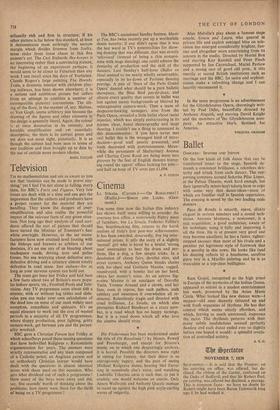Television
I'm do mathematician and am as aware as you are that 'statistics can be made to prove any- thing,' yet I feel I'm not alone in falling, every time, for BBC's Facts and Figures. Very few issues are dealt with at a time and one gets the impression that the authors and producers have a proper respect for the material they are handling. They know the dangers of over- simplification and also realise the powerful impact of the relevant facts (daily given situa- tion. Not long ago their analysis of road acci- dents offered the sort of picture that should have turned the Minister of Transport's hair white overnight. However, as the car manu- facturers have now attained level footing with the bishops and brewers as arbiters of our destinies, it's no use any of us bleating about inadequate roads, driving tests and police • forces. No use worrying about defective cars, defective driving and a citizenry almost totally defective in road sense. Just endure—for as long as your nervous system can hold out.
The team got busy last Friday and laid bare a few facts about two of Britain's more popu- lar indoor sports, viz., Football Pools and Tele- vision. Any TV programme costs about £40 a minute; with or without log tables and slide- rules you can make your own calculations of the dead loss on some of our most widely seen comperes, comedians and quizzers. It's an equal pleasure to work out the cost of wasted periods in a majority of all TV programmes. where sloppy production, poor lighting, gritty camera-work, get between you and the person- ality involved.
BBC gave a Christian Forum last Friday at which schoolboys posed those teasing questions that have bedevilled Religious v. Rationalistic argumentation for years. The answers were strictly representative and any team composed of a Catholic priest, an Anglican parson and an orthodoxly Christian lawyer would have dealt with the questions in almost identical terms with those used on this occasion. Who gets what dividend out of such a programme? How many of the boys went away and did, say, five seconds' worth of thinking about the problems; how many were there for the, thrill of being on a TV programme? The BBC's occasional Sunday feature, Music at Ten, has twice recently put up a worthwhile dance novelty; if one didn't agree that it was the last word in TV's potentialities for show- ing dancing that was different, that was strictly 'televisual' (instead of being a thin compro- mise with stage dancing), one could admire the dexterity of production and the skill of the dancers. Last Sunday's half-hour (Ballet en bleu) seemed to me nearly wholly catastrophic, especially in its let-down of Parisian dancing prestige. A pair of 'Stars of the Paris Grand Opera' danced what should be a pure balletic showpiece, the Blue Bird pas-de-deux, and almost every quality that counts in ballet was lost against messy backgrounds or blurred by unimaginative camera-work. Then a team of desperate-looking teenagers, also from the Paris Opera, revealed a little ballot about racial injustice, which was simply embarrassing in its jejcune ideas, banal choreography and inept dancing. I couldn't see a thing to commend in this demonstration : if you have never met real ballet this is the wrongest kind of intro- duction—good stuff poorly presented, and trash decorated with pretentiousness. Mean- while the pavements of Shaftesbury Avenue and Charing Cross Road arc being worn into grooves by the feet of English dancers tramp- ing round the agents' offices looking for jobs— and half an hour of TV costs just £1,094.
A. V. COTON


























































 Previous page
Previous page